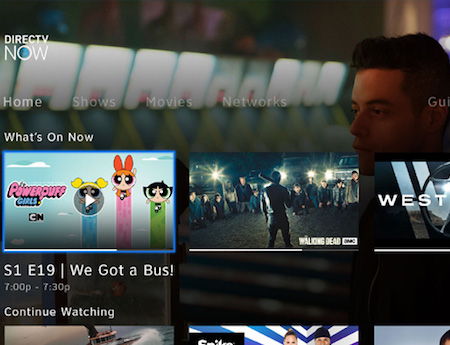AT&T Defends DirecTV Now… Again

The smarter way to stay on top of broadcasting and cable industry. Sign up below
You are now subscribed
Your newsletter sign-up was successful
"Second verse, same as the first," Herman's Hermits once intoned. AT&T sang a similar tune Thursday in responding, "again," to the FCC Wireless Bureau's query (and competitive concerns) about DirecTV Now and other zero rating business models. That is according to a copy of the AT&T letter to the FCC obtained by B&C.
Zero rating plans are ones in which subs watch wired or wireless video without that counting against their data allowances.
The FCC has said those, which content suppliers sponsor, can be pro-competition but need looking at on a case-by-case basis. In this case, the FCC's Wireless Bureau has suggested—twice—it was anticompetitive.
In AT&T's second response—filed Dec. 15, after the bureau still had issues with AT&T's first response—AT&T explains "again" that the bureau's suggestion that its zero rating plan may violate the FCC's Open Internet order is an approach to the consumer-friendly offerings that "would deny consumers a service they value, raise prices, lower consumption, and curb the disruptive potential of Data Free TV, all in the name of preserving profit margins for individual DIRECTV rivals."
The network neutrality rule violation issue could be moot under a Republican FCC that could roll back the order or ramp down general conduct standard reviews, but Wheeler will remain chairman until Jan. 20.
AT&T also points out in the letter that the FCC's zero ratings concerns remain at the bureau level, not the commissioner level, because the letter "would require that the Commissioners be given an opportunity to consider the analysis," which they have yet to get.
As for the bureau, "it has still articulated no plausible basis for challenging Data Free TV as “anticompetitive," said AT&T.
The smarter way to stay on top of broadcasting and cable industry. Sign up below
The Republicans on that commission, soon to be in the majority, are not likely to agree with the bureau analysis, one that AT&T calls a "novel interpretation" of the Open Internet Order's general conduct standard that "guts decades of regulatory and competition policy precedent."
AT&T points out that fact to the bureau in its letter when it talks about the bureau lacking the authority to take any action: "Any doubts on that score were put to rest when two FCC Commissioners, both of whom will remain in office after the imminent change of administration, criticized this investigation and warned the Bureau against unlawfully usurping core policymaking powers that only the Commission may exercise," AT&T wrote. "Those Commissioners also observed that whatever judgment the Bureau purports to pass on this program before January 20 will very likely be reversed shortly thereafter. Their remarks confirm that the Bureau lacks delegated authority to pull the plug on Data Free TV and disrupt service to the millions of customers who now enjoy that feature."
Asked at a press conference Thursday what action the FCC might be taking on zero rating before he left, Wheeler would only say that the investigation continues, suggesting that was just part of an ongoing investigation and a job still to do, rather than a controversial item Republicans warned the FCC not to proceed on during the transition.
AT&T's main points of issue with the bureau's position are: "the bureau does not defend its original proposal for a broad presumption against charging third parties for telecommunications inputs that a common carrier also provides to its edge affiliate; the bureau articulates no cognizable 'price squeeze' claim; pulling the plug on data free TV would affirmatively harm consumers; and 'the Bureau lacks delegated authority to challenge data free TV.'"
Back in October, the FCC fired a warning shot at AT&T's free data service for mobile customers, saying the combination of DirecTV Now and AT&T Mobility sponsored data plans "appears to present significant anti-competitive effects."
On the same day that Donald Trump was elected, signaling a likely far more deregulatory FCC—Trump wants two regs jettisoned whenever one is added—Jon Wilkins, chief of the Wireless Bureau, wrote to AT&T senior VP Bob Quinn to say the bureau thinks their sponsored data mobile broadband plan combined with zero rating DirecTV video apps for AT&T Mobility subs "may" obstructs competition.
He "invited" AT&T to explain why the bureau was not right to be concerned. AT&T did, saying that DirecTV Now was "precisely the kind of pro-consumer challenge to cable that the Commission heralded in approving AT&T's acquisition of DirecTV." But Wilkins countered that the bureau still thought such free data plans are anticompetitive and sought further input. That is what AT&T submitted Thursday, the day FCC chairman Tom Wheeler announced he will exit Jan. 20 to make way for the Trump-led FCC.
Contributing editor John Eggerton has been an editor and/or writer on media regulation, legislation and policy for over four decades, including covering the FCC, FTC, Congress, the major media trade associations, and the federal courts. In addition to Multichannel News and Broadcasting + Cable, his work has appeared in Radio World, TV Technology, TV Fax, This Week in Consumer Electronics, Variety and the Encyclopedia Britannica.

